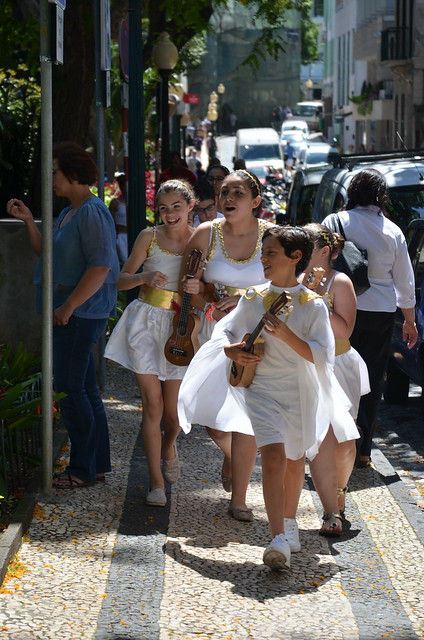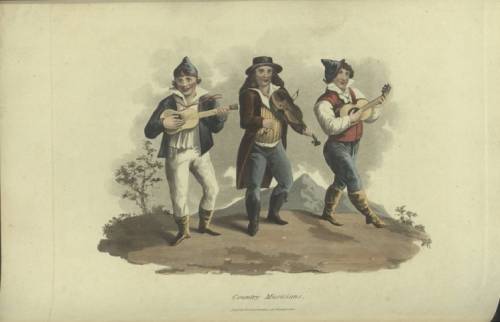Madeira
The peasants of this island, almost without exception, play on the guitar, or some stringed instrument of a similar construction.
Combe, William: A History of Madeira. London: R. Ackermann 1821, S. 77
The same book also features a group of „country musicians“, one of whom holds a violin and two small guitars:
These guitars (braguinha and rajão) are direct forerunners of the ukulele. One of the immigrants from Madeira was the most successful producer of ukuleles in early times, Manuel Nunes, who also claimed to have invented the ukulele.
At this hour the peasantry may be seen returning to their homes in little parties of four or five, each group being accompanied by a musician playing on the national instrument, the machetes, or guitarette, and singing some plaintive air in which, occasionally, all join. No sooner has one group passed, than the sweet, soft intonations of other songster are heard approaching. Sometimes two or even more parties will enter the street at the same time, when they at once take up alternate parts, and that, with such perfect taste and harmony, that when the notes begin to die away in the distance, the listener's ear is aching with attention. These songs are usually of their own composition, and are improvised for the occasion.1)
The people take a great delight in singing in a high monotone and playing on the guitar and the native regàs and machete. When they play in concert on a calm evening it is tolerably effective, and some few of them attain a wonderful execution and excellence; but their instruments are of an inferior order.2)
Videos
Ukulele in Madeira
Die Ukulele auf Madeira

Schoolkids in Funchal (Madeira) with Braguinhas (2017)
Social status on Hawaii
The social status of the immigrant Portuguese who from 1878 came in high numbers as contract workers to Hawaii was low. For a long time they belonged to the non-educated layers of society. They suffered from numerous prejudices, e.g. the charge of crime, and were officially not considered as „Caucasians“ (whites) until 1940. This led to a collective inferiority complex.3) Only then did many of them rise to the middle class.4) The success story of Nunes is therefore cited as a positive exception.5)
References
- Estep, Gerald Allen: Social Status of the Portuguese in Hawaii as Indicated by Factors of Immigration. M.A. Thesis, Department of Sociology, University of South California 1941



